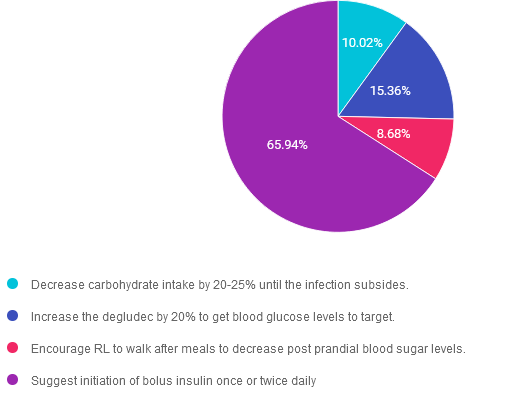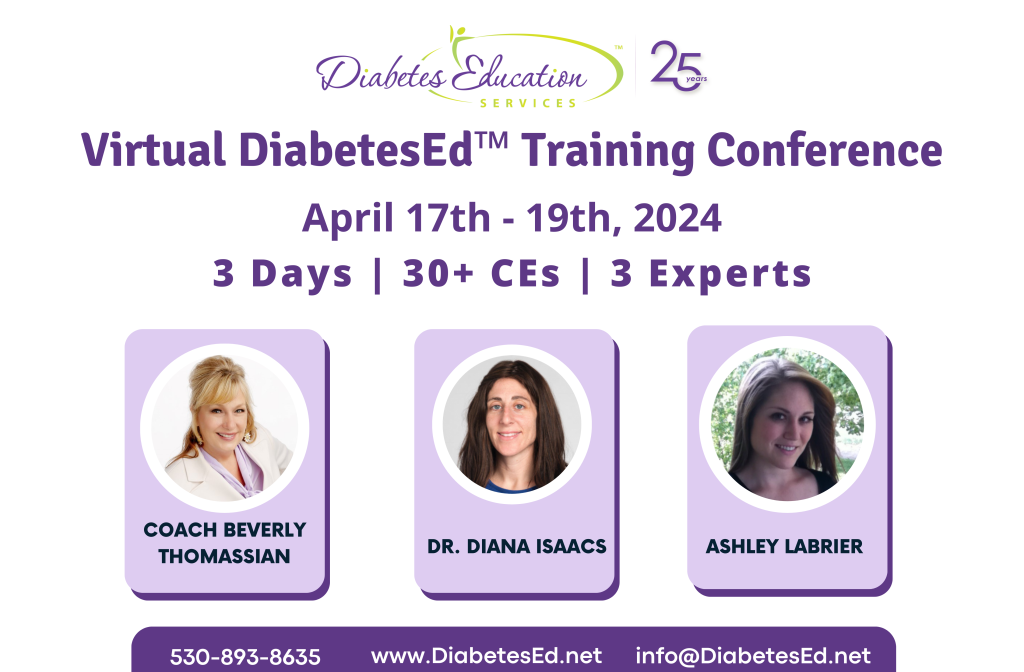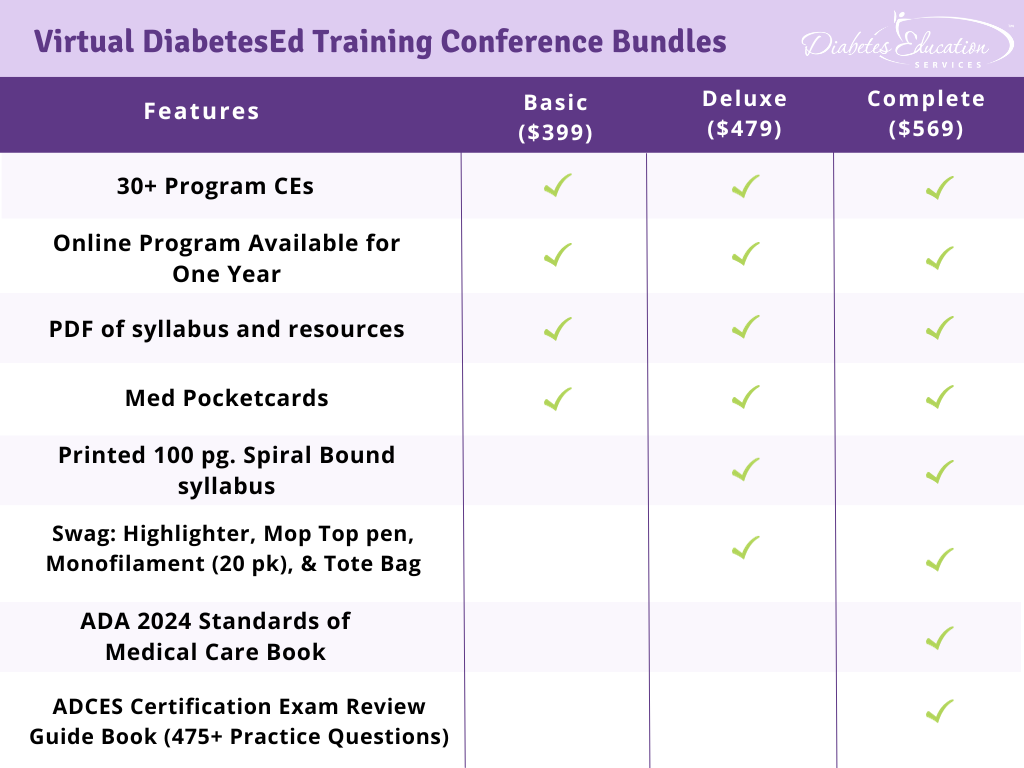
For last week’s practice question, we quizzed participants on addressing sudden hyperglycemia due to cellulitis. 66% of respondents chose the best answer. We want to clarify and share this important information, so you can pass it on to people living with diabetes and your colleagues, plus prepare for exam success!
Before we start though, if you don’t want any spoilers and haven’t tried the question yet, you can answer it below: Answer Question
Question: RL is 83, has Latent Autoimmune Diabetes, and takes degludec 17 units every morning along with metformin 500 XR twice daily. RL tells you that their left leg was suddenly swollen and red, so they went to urgent care and were started on a course of antibiotics. In the meantime, their CGM is showing elevated blood sugars in the 200 to 350 range during the day but often less than 100 at night. RL weighs 70kg, with a BMI of 23.4.
Based on this information, what action do you suggest?
Answer Choices:
- Decrease carbohydrate intake by 20-25% until the infection subsides.
- Increase the degludec by 20% to get blood glucose levels to target.
- Encourage RL to walk after meals to decrease post prandial blood sugar levels.
- Suggest initiation of bolus insulin once or twice daily.

Getting to the Best Answer
If you are thinking about taking the certification exam, this practice test question will set you up for success. Test writers anticipate possible answers based on the details in the question. They will wave those “juicy answers” right under your nose. Your job is to weed through the particulars, pluck out the most important elements and choose the BEST answer.
Answer 1 is incorrect. 10.02% chose this answer. “Decrease carbohydrate intake by 20-25% until the infection subsides.” Since RL has elevated glucose levels due to infection, drastically decreasing carbohydrate intake is not the best approach to manage glucose levels. We want to ensure RL has adequate nutrition given her infection and age.
Answer 2 is incorrect. 15.36% of you chose this answer. “Increase the degludec by 20% to get blood glucose levels to target.” It seems that RL needs more insulin to lower daytime glucose levels. However, RL is experiencing glucose levels less than 100 overnight, which puts them at risk of nocturnal hypoglycemia. If we increase basal insulin by 20%, this dramatic increase could cause a dangerous drop in overnight glucose levels and is not recommended.
Answer 3 is incorrect. About 8.68% of respondents chose this. “Encourage RL to walk after meals to decrease post prandial blood sugar levels.” Keeping active is always a good idea, but with blood sugars running 200-350 during the day, walking after meals won’t be enough to get glucose levels to target. Plus, it may not be safe to promote walking since they have an infection and a leg that is swollen and red.
Finally, Answer 4 is correct. 65.94% chose this answer. “Suggest initiation of bolus insulin once or twice daily.” YES, this the best answer. Counterregulatory hormones are released during periods of infection that contribute to insulin resistance and hyperglycemia. To get blood glucose levels to target, RL will need daytime bolus insulin to manage the hyperglycemia, which will promote healing. Of course, treatment with antibiotics will also help to lower glucose levels.
We hope you appreciate this week’s rationale! Thank you so much for taking the time to answer our Question of the Week and participate in this fun learning activity!
Want to learn more about this question?
Virtual DiabetesEd Training Conference – Join us Live on April 17th – 19th 2024 at 11:30 AM PST

Join Coach Beverly and Team for two and a half days of knowledge-sharing, fun, and “aha” moments for our Virtual DiabetesEd Training Conference April 17th – 19th, 2024.
Attendees will leave this conference with new tools and a refreshed understanding of the latest advances in person-centered diabetes care. Our team highlights the ADA Standards of Care, medications, behavior change, technology, medical nutrition therapy, and more!
Our instructors co-teach the content to keep things fresh and lively.
Friend Discount: 3 or more only $449 per person. Email us at [email protected] with the name and email of each registrant to get the discount!
Program Details
- Dates: April 17-19th, 2024
- Registration Fee: $399-$569 (see more about reg. options below)
- Friend Discount: For 3 or more people, each person saves $50 off their registration. Email us at [email protected] with the name and email of each registrant to get the discount!
- CEs: 30+ CEs | 18 units for Virtual Conference plus 10+ Bonus CEs. CEs can be applied toward CDCES’s initial application or renewal.
- Speakers: View Conference Faculty
Registration Options

Sign up for Diabetes Blog Bytes – we post one daily Blog Byte from Monday to Friday. And of course, Tuesday is our Question of the Week. It’s Informative and FREE! Sign up below!
Accreditation: Diabetes Education Services is an approved provider by the California Board of Registered Nursing, Provider 12640, and our CPEU courses have received Prior Approval* from the Commission of Dietetic Registration (CDR), Provider DI002. Since our CPEU courses received Prior approval* from the CDR, these CPEU courses satisfy the CE requirements for the CDCES /BC-ADM regardless of your profession!
The use of DES products does not guarantee the successful passage of the certification exam. CBDCE and ADCES do not endorse any preparatory or review materials for the CDCES or BC-ADM exams, except for those published by CBDCE & ADCES.









